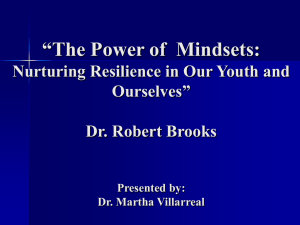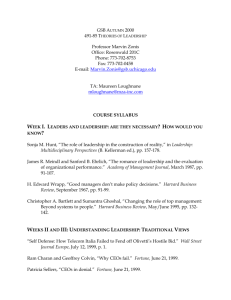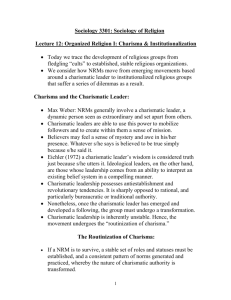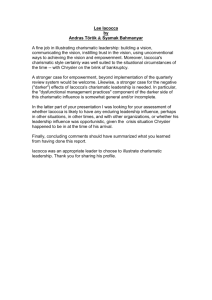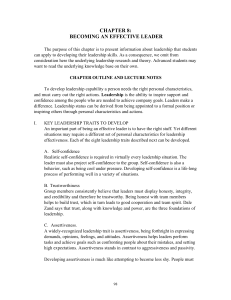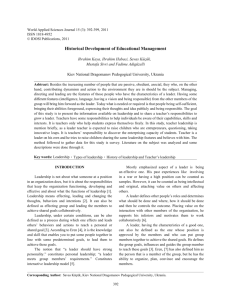Can You Learn to Be a Charismatic Leader?
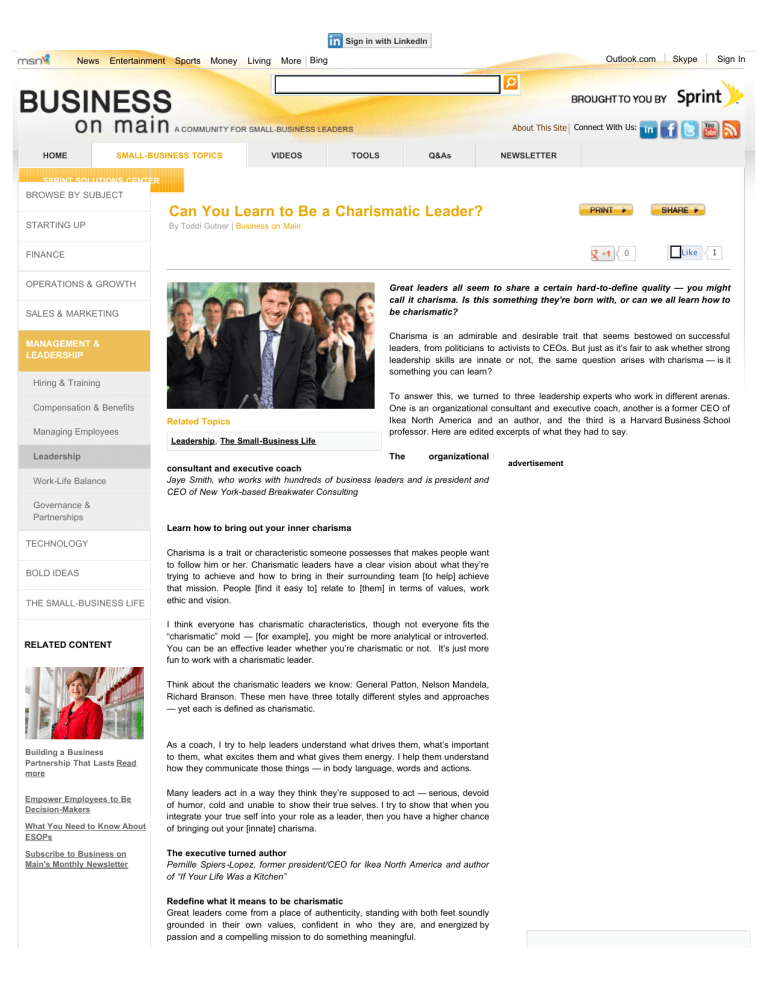
News Entertainment Sports Money Living More Bing
Sign in with LinkedIn
Outlook.com
Skype Sign In
About This Site Connect With Us:
HOME SMALL-BUSINESS TOPICS VIDEOS TOOLS Q&As
SPRINT SOLUTIONS CENTER
BROWSE BY SUBJECT
STARTING UP
Can You Learn to Be a Charismatic Leader?
By Toddi Gutner | Business on Main
NEWSLETTER
FINANCE 0
OPERATIONS & GROWTH
SALES & MARKETING
MANAGEMENT &
LEADERSHIP
Hiring & Training
Compensation & Benefits
Managing Employees
Leadership
Work-Life Balance
Governance &
Partnerships
TECHNOLOGY
BOLD IDEAS
Like 1
Great leaders all seem to share a certain hard-to-define quality — you might call it charisma. Is this something they’re born with, or can we all learn how to be charismatic?
Charisma is an admirable and desirable trait that seems bestowed on successful leaders, from politicians to activists to CEOs. But just as it’s fair to ask whether strong leadership skills are innate or not, the same question arises with charisma — is it something you can learn?
Related Topics
To answer this, we turned to three leadership experts who work in different arenas.
One is an organizational consultant and executive coach, another is a former CEO of
Ikea North America and an author, and the third is a Harvard Business School professor. Here are edited excerpts of what they had to say.
Leadership , The Small-Business Life
The organizational consultant and executive coach
Jaye Smith, who works with hundreds of business leaders and is president and
CEO of New York-based Breakwater Consulting advertisement
THE SMALL-BUSINESS LIFE
RELATED CONTENT
Learn how to bring out your inner charisma
Charisma is a trait or characteristic someone possesses that makes people want to follow him or her. Charismatic leaders have a clear vision about what they’re trying to achieve and how to bring in their surrounding team [to help] achieve that mission. People [find it easy to] relate to [them] in terms of values, work ethic and vision.
I think everyone has charismatic characteristics, though not everyone fits the
“charismatic” mold — [for example], you might be more analytical or introverted.
You can be an effective leader whether you’re charismatic or not. It’s just more fun to work with a charismatic leader.
Think about the charismatic leaders we know: General Patton, Nelson Mandela,
Richard Branson. These men have three totally different styles and approaches
— yet each is defined as charismatic.
Building a Business
Partnership That Lasts Read more
Empower Employees to Be
Decision-Makers
What You Need to Know About
ESOPs
Subscribe to Business on
Main's Monthly Newsletter
As a coach, I try to help leaders understand what drives them, what’s important to them, what excites them and what gives them energy. I help them understand how they communicate those things — in body language, words and actions.
Many leaders act in a way they think they’re supposed to act — serious, devoid of humor, cold and unable to show their true selves. I try to show that when you integrate your true self into your role as a leader, then you have a higher chance of bringing out your [innate] charisma.
The executive turned author
Pernille Spiers-Lopez, former president/CEO for Ikea North America and author of “If Your Life Was a Kitchen”
Redefine what it means to be charismatic
Great leaders come from a place of authenticity, standing with both feet soundly grounded in their own values, confident in who they are, and energized by passion and a compelling mission to do something meaningful.
When I met the new CEO for Ikea, I remember sharing my initial impression with a colleague. The new CEO seemed somewhat introverted and not really enthusiastic. Instead of sharing his HR vision with us, he delegated it for us to create. I was frustrated.
This article has 87% thumbs up.
Did you like this article? Rate it by clicking on a button below.
Ten years later, he had driven Ikea to a dramatically different place — big expansion in both new and mature markets, a broader assortment with much improved quality, new supply setup, focus on customers, our people, diversity and culture. I had the great fortune to work directly with him for over eight years.
He never changed from the man I first met — I simply learned something about real leadership. He knew who he was and surrounded himself with very different strengths than his own. He trusted the organization, the people, and delegated with confidence — he left his ego at the door.
Don't be fooled by first impressions. Some people have a more outgoing personality that impresses others easily. What really matters is what you leave behind. When you know who you are, what you stand for, are passionate about your mission, and have decided to take the lead in moving it forward — your will inspire others to come along on the journey. That is charisma!
The business school professor
Gautam Mukunda, assistant professor at Harvard Business School and author of the new book “Indispensable: When Leaders Really Matter”
Being charismatic doesn’t make you a good leader
If you want to learn to be charismatic, you need to understand charisma. It often seems like you know charisma when you see it, but a leader who is charismatic to one person can seem completely ineffective to another. Charisma is a social construct, something we attribute to leaders to explain their ability to persuade and attract followers.
Even so, we’ve all met people whose personality seems like a force in the room. I think that’s a good definition of charisma: the ability to persuade people to do things, by force of personality, that you couldn’t persuade them to do by rational argument.
Charisma is dangerous. It makes good leaders better, sure, but it also makes bad ones worse — because it lets them execute mistaken policies that a less charismatic leader could never have implemented.
So, should you want to become more charismatic, and if so, how can you do it? Want it only if you’re pursuing a goal important enough that it’s worth the risk of being disastrously wrong. As for how, Olivia Cabane wrote an excellent book, “The Charisma Myth,” describing a variety of strategies. Combine when and how and you get a simple answer: Be authentic.
There are many ways to be charismatic — the one constant is that your personality is only truly powerful when it’s true to itself. If you’re wrong, at least you’re pushing what you believe in. If you’re right, you’ll change yourself, your organization and maybe even the world.
© Business on Main . Sign up for our Main Street Authority newsletter to get articles like this delivered monthly to your inbox.
Toddi Gutner is an award-winning journalist, writer and editor and currently a contributing writer covering personal finance for Reuters.
Read more articles by Toddi
Follow Toddi on Twitter
MSN Privacy Advertise Terms of Use Site Map Help and Feedback Code of Conduct About Our Ads Trademark
© 2013 Microsoft
